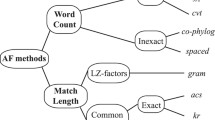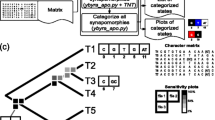Abstract
Using simulated data, we tested whether the AFLP technique can consistently be used to estimate accurate evolutionary trees. We generated DNA sequences with known phylogenies that were used to simulate the AFLP procedure. In silico AFLP fingerprints were used to estimate neighbor-joining AFLP-based trees. The comparison of the true tree to the AFLP trees obtained over a wide range of conditions indicates that AFLPs usually lead to the wrong phylogeny except when DNA sequences are closely related, typically below the taxonomic rank of species.
Access this chapter
Tax calculation will be finalised at checkout
Purchases are for personal use only
Preview
Unable to display preview. Download preview PDF.
Similar content being viewed by others
References
Meudt, H.M., Clark, A.C.: Almost forgotten or latest practice? AFLP applications, analyses and advances. Trends Plant. Sci. 12, 106–117 (2007)
Koopman, W.J.M.: Phylogenetic signal in AFLP datasets. Syst. Biol. 54, 197–217 (2005)
Caballero, A., Quesada, H., Rolán-Alvarez, E.: Impact of amplified fragment length polymorphism size homoplasy on the estimation of population genetic diversity and the detection of selective loci. Genetics 179, 539–554 (2008)
O’Hanlon, P.C., Peakall, R.: A simple method for the detection of size homoplasy among amplified fragment length polymorphisms fragments. Mol. Ecol. 9, 815–816 (2000)
Rambaut, A., Grassly, N.C.: Seq-Gen: an application for the Monte Carlo simulation of DNA sequence evolution along phylogenetic trees. Comput. Appl. Biosci. 13, 235–238 (1997)
Swofford, D.L.: PAUP*: phylogenetic analysis using parsimony (*and other methods), version 4. Sinauer Associates, Sunderland, Massachusetts (1999)
Soria-Carrasco, V., Talavera, G., Igea, J., Castresana, J.: The K tree score: quantification of differences in the relative branch length and topology of phylogenetic trees. Bioinformatics 23, 2954–2956 (2007)
Author information
Authors and Affiliations
Editor information
Editors and Affiliations
Rights and permissions
Copyright information
© 2009 Springer-Verlag Berlin Heidelberg
About this paper
Cite this paper
García-Pereira, M.J., Quesada, H., Caballero, A. (2009). A First Insight into the In Silico Evaluation of the Accuracy of AFLP Markers for Phylogenetic Reconstruction. In: Omatu, S., et al. Distributed Computing, Artificial Intelligence, Bioinformatics, Soft Computing, and Ambient Assisted Living. IWANN 2009. Lecture Notes in Computer Science, vol 5518. Springer, Berlin, Heidelberg. https://doi.org/10.1007/978-3-642-02481-8_173
Download citation
DOI: https://doi.org/10.1007/978-3-642-02481-8_173
Publisher Name: Springer, Berlin, Heidelberg
Print ISBN: 978-3-642-02480-1
Online ISBN: 978-3-642-02481-8
eBook Packages: Computer ScienceComputer Science (R0)




